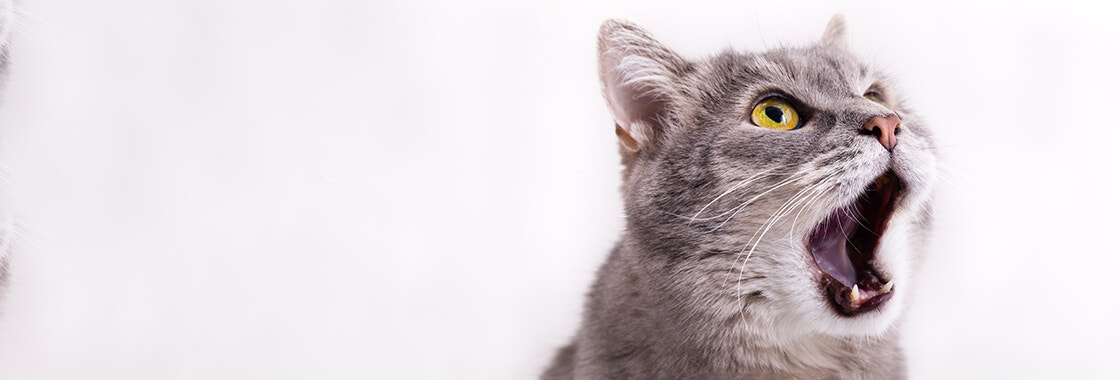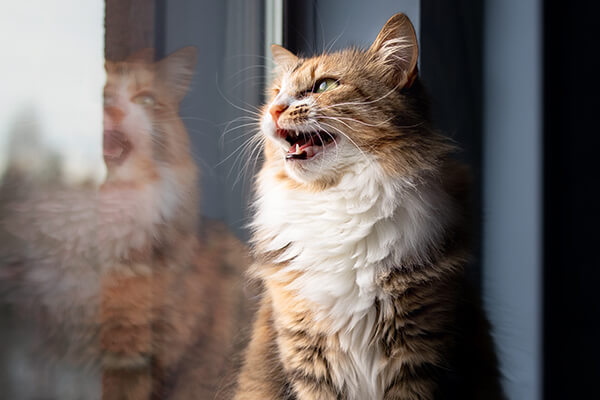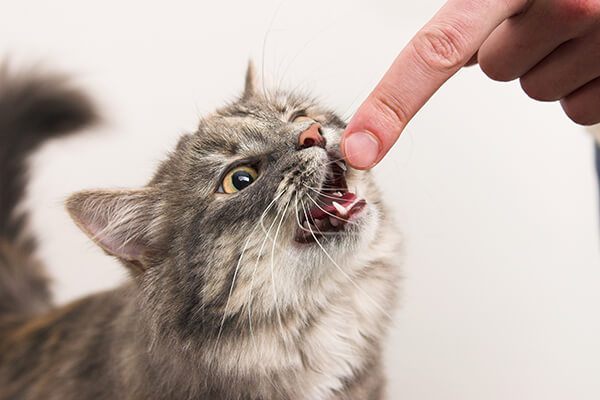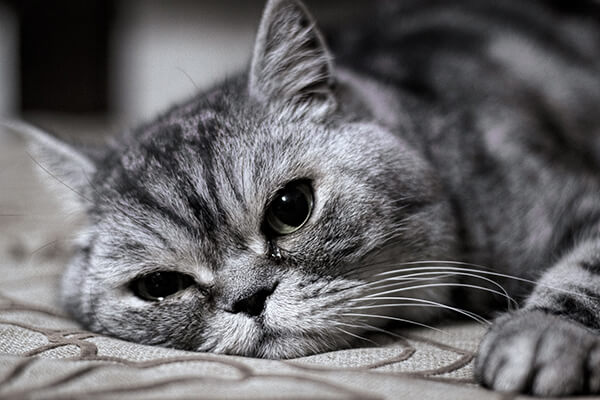- Homepage
- Blog
- Bonding & Care
- Why Do Cats Meow
Why do cats meow? Cat communication


Share
Cats meow for all sorts of reasons, but primarily they will meow to get their human’s attention, to communicate with you, or simply to say hello. Learning the basics of cat communication can help you to bond with your fur baby, and meowing is an important signal that they want or need something.
A meowing cat can mean they want to play, they want food, want to go out, or to tell you that something is wrong. Whereas a yowling cat can mean they are lonely, lost, distressed, in pain or ‘in heat’ - which is when an in-season cat calls out to look for a mate. This article looks into the intricacies of cat communication, looking into why do cats meow at humans, and what does it mean when a cat meows at you in a certain way?
Understanding cats meowing
When cats are little they use meowing to communicate with their mother. It’s a strong instinctive behaviour when they’re young, but as they grow up cats don’t usually meow at other cats. So why do cats meow at humans?
Cats have a broad range of vocabulary to communicate directly with their owners in different situations, shown by varying the volume, length and pitch of the meow. They may do a short meow, as a hello or thank you, or they might do a louder meow to attract your attention (particularly around dinner time). This meow can get louder and more urgent the more desperately they want your attention - such as if they’re hungry, thirsty, or need to go to the toilet - and they’re not afraid to turn up the volume to express their needs. Some cats are more talkative than others, so learning to decipher your own cats' meows can be useful for both of you to understand one another.
If you’ve suddenly noticed your cat snoring loudly, or they are meowing differently, hiding away or you notice repeated cat sneezing, it may be that they are unwell and they are trying to communicate this with you.
What does it mean when your cat meows?
A short meow may mean they want to play or be stroked. If their meow accompanies purring, they might be trying to give you a gentle warning that they don’t want you to stop petting them. It’s important to observe your cat’s behaviour when they meow at you. Generally, a short and friendly ‘hello’ cat meow, or a louder ‘I want something’ meow, is a nice way for your cat to chat directly to you, and it is part of how cats show affection and trust for their owner.
However, what does it mean when a cat meows incessantly, or starts yowling? A shrill meow or mew, or long yowl, is something to listen out for. Cats meowing without an obvious reason can indicate that they’re feeling stressed, or they’re unwell or in discomfort. Take a look at your cat’s behaviour - if you notice your cat yawning excessively, or growling, wagging their tail, hiding in a corner or aren’t eating as normal, they’ll need to visit the vet for an examination. Older cats can also meow more if they’re confused. A long yowl can also indicate that your cat is looking for a mate. Either way, any unusual or excessive meowing should be checked out by an expert.
Why do cats meow to their humans?
Cats often meow to humans to get their attention. It’s a sweet dialogue that most cats reserve just for you, rather than for other cats or non-family members. As you get to know your cat, you may start to quickly understand what it is that they want in order to respond to their needs. But why do cats meow at humans and not other cats? It’s thought that domestic cats have evolved to make their meows more appealing to the human ear, and it’s clearly pretty effective at getting our attention. Cats tend to communicate more with one another through scent and body language, which can be easily missed by humans, so after kittenhood they tend to use their voice just to talk to us.
Cats tend to have their own unique vocal range, and some breeds meow more than others - such as Siamese, Bengals and Maine Coons. It’s important to spend time with your cat to get to know their pattern of chat, so you know when something is out of the ordinary. This helps you to build a stronger bond together and support their overall wellbeing.
Why does my cat walk around the house meowing?
Cats meowing around the house can mean that they’re trying to find you, just like they would as kittens for their mother. If they are yowling around the house it could also be because they are looking for a mate, but this would not usually happen if your cat has been spayed or neutered. It can also indicate that they are unwell, are feeling stressed, are very hungry or thirsty, or that they’ve brought you in a special present and are announcing their gift (lovely).
Other reasons for cats meowing around the house include if they’re worried, can’t find their litter tray, have lost a toy, they hear other animals or something has unsettled them. They may also simply be bored, looking for attention, or are trying to find another human to address their needs if another is ignoring their requests for food.
Why does my cat keep meowing for no reason?
Cats rarely meow for no reason at all. Lots like to say ‘hi’, tell you how they’re feeling, or to let you know that they want something. Persistent meowing can mean that your cat is upset, or is suffering with pain, illness or discomfort. It’s best to get this checked out by a vet.
If you have a cat who loves their food and is constantly wanting feeding, petting or play time, constant meowing can be frustrating. If you want to discourage your cat’s meowing, try not responding immediately to their demands. Stick to planned meal times and only reward them with attention when they’ve finished asking. Equally, the incessant yowling of an in-season female cat, or a male wanting a mate, can be annoying - especially at 3am. You may wish to consider neutering or spaying your cat.
The better you get to know your cat, the easier it is to work out why they’re meowing and what their meows mean. Owners who are strongly bonded with their cats will be able to spot the signs of illness or distress sooner. Each cat may have their own little language which they share only with you, serving as a reminder of the special relationship that you can enjoy as a pet parent. Discover more about understanding cats meowing and other behaviour on our blog.



